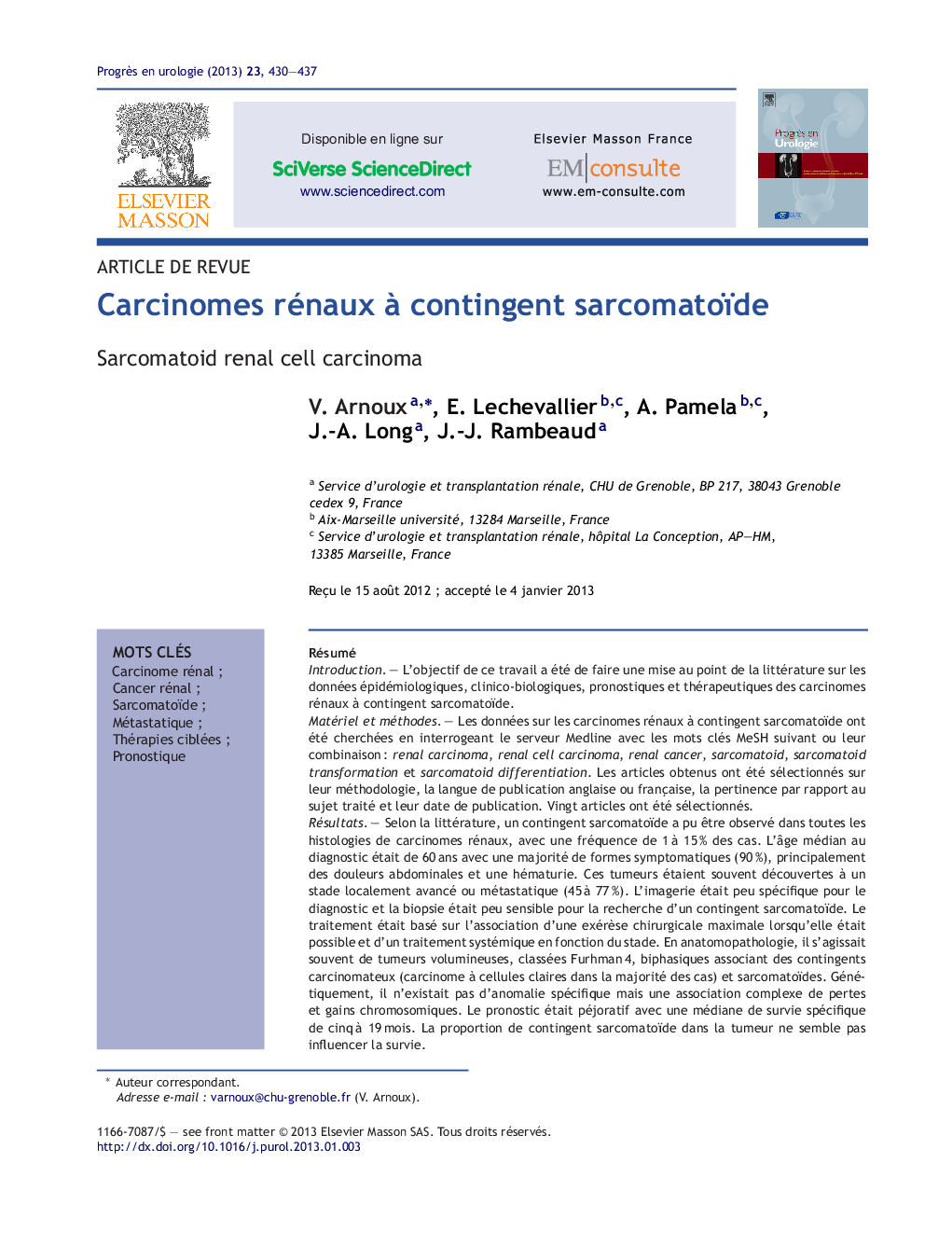| Article ID | Journal | Published Year | Pages | File Type |
|---|---|---|---|---|
| 3823182 | Progrès en Urologie | 2013 | 8 Pages |
RésuméIntroductionL’objectif de ce travail a été de faire une mise au point de la littérature sur les données épidémiologiques, clinico-biologiques, pronostiques et thérapeutiques des carcinomes rénaux à contingent sarcomatoïde.Matériel et méthodesLes données sur les carcinomes rénaux à contingent sarcomatoïde ont été cherchées en interrogeant le serveur Medline avec les mots clés MeSH suivant ou leur combinaison : renal carcinoma, renal cell carcinoma, renal cancer, sarcomatoid, sarcomatoid transformation et sarcomatoid differentiation. Les articles obtenus ont été sélectionnés sur leur méthodologie, la langue de publication anglaise ou française, la pertinence par rapport au sujet traité et leur date de publication. Vingt articles ont été sélectionnés.RésultatsSelon la littérature, un contingent sarcomatoïde a pu être observé dans toutes les histologies de carcinomes rénaux, avec une fréquence de 1 à 15 % des cas. L’âge médian au diagnostic était de 60 ans avec une majorité de formes symptomatiques (90 %), principalement des douleurs abdominales et une hématurie. Ces tumeurs étaient souvent découvertes à un stade localement avancé ou métastatique (45 à 77 %). L’imagerie était peu spécifique pour le diagnostic et la biopsie était peu sensible pour la recherche d’un contingent sarcomatoïde. Le traitement était basé sur l’association d’une exérèse chirurgicale maximale lorsqu’elle était possible et d’un traitement systémique en fonction du stade. En anatomopathologie, il s’agissait souvent de tumeurs volumineuses, classées Furhman 4, biphasiques associant des contingents carcinomateux (carcinome à cellules claires dans la majorité des cas) et sarcomatoïdes. Génétiquement, il n’existait pas d’anomalie spécifique mais une association complexe de pertes et gains chromosomiques. Le pronostic était péjoratif avec une médiane de survie spécifique de cinq à 19 mois. La proportion de contingent sarcomatoïde dans la tumeur ne semble pas influencer la survie.ConclusionLe carcinome rénal à contingent sarcomatoïde est un facteur pronostique défavorable de gravité d’un carcinome rénal. Principalement de découverte symptomatique et à un stade avancé, il a un pronostic péjoratif, nécessitant une prise en charge pluridisciplinaire rapide et adaptée.
SummaryIntroductionThe objective was to perform a systematic review of literature concerning epidemiology, clinical and biological data, prognosis and therapy of sarcomatoid renal cell carcinomas.Material and methodsData on sarcomatoid renal cell carcinomas have been sought by querying the server Medline with MeSH terms following or combination of them: “renal carcinoma”, “renal cell carcinoma,” “renal cancer”, “sarcomatoid” “sarcomatoid transformation” and “sarcomatoid differentiation.” The articles obtained were selected according to their methodology, the language in English or French, the relevance and the date of publication. Twenty papers were selected.ResultsAccording to the literature, a sarcomatoid contingent can be observed in all subtypes of renal cell carcinomas, with a frequency of 1 to 15% of cases. The median age at diagnosis was 60 years with a majority of symptomatic patients (90%), mainly with abdominal pain and hematuria. These tumors were often found in patients with locally advanced or metastatic (45–77%). The imaging was not specific for the diagnosis and biopsy had a low sensitivity for identifying a sarcomatoid contingent. The treatment was based on a combination of maximal surgical resection whenever possible and systemic therapy for metastastic disease. Pathological data often showed large tumors, Furhman 4 grades, combined biphasic carcinomatous contingent (clear cell carcinoma in most cases) and sarcomatoid. Genetically, there was no specific abnormality but a complex association of chromosomal additions and deletions. The prognosis was pejorative with a specific median survival of 5 to 19 months without any impact of the sarcomatoid contingent rate.ConclusionSarcomatoid renal cell carcinoma is a form not to ignore despite its rarity. Mainly symptomatic and discovered at an advanced stage, it has a poor prognosis, requiring multidisciplinary management quickly and correctly.
